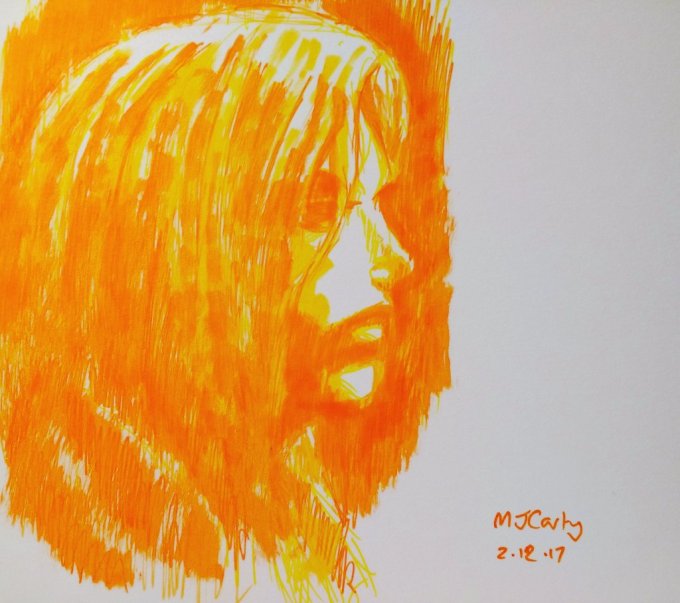
What seven books mean the most to you? This is my selection of seven books that mean the world to me right now – a mix of current raves and lifelong faves.
At the start of this year, my friend Steve Tovey tagged me in a social media challenge to share covers of seven books that I enjoy.
Now this is a challenge I can get behind. This post is my contribution. I’m bending the rules a tiny tad here, by relaxing slightly the part about “no explanations, no reviews.” I can’t let these lovely volumes go without a few words on what they have meant to me. I think it would be impossible for me to pick seven desert island books. So these seven are a mix of current, recent and all-time favourites.
To anybody reading these words: I hereby nominate you, should you fancy it. What seven books mean the world to you? Please do let me know your own selection.
1. Brian Eno – A Year With Swollen Appendices

“My week beats your year,” Lou Reed once said. Brian Eno goes one better. Just a day in the life and mind of Brian Eno beats pretty much anybody’s day, week or year. A Year With Swollen Appendices is easily the book I reread or casually dip into more than any other. It presents Eno’s complete diary entries for 1995, augmented with copious additional material (which constitute the titular “swollen appendices”). It gives you direct access to the boundless curiosity and creativity of Eno’s mind. His outlook can change your own perception of what is possible in this world. This book is a fount of inspiration. The dog-eared nature of my copy reflects how often I consult it.
Just above Eno’s book in this picture is a London zone 1 to 4 travelcard, which has long been my bookmark for this tome. It’s dated 17 May 1997 (a Saturday, Google informs me), which I think must have been the day I bought my copy. Was there really a time when you could travel around England’s capital for a whole day for just £3.60?
- Brian Eno – A Year With Swollen Appendices.
Martin Amis – Experience

A fascinating life story, a dazzling prose stylist at the height of his powers. One of the most attitude-heavy cover shots imaginable, depicting the author in his tender (though not that tender, clearly) years. All this, plus some fiercely clear-eyed lessons in grammar from a master of this neglected art.
- Martin Amis – Experience.
Marcus Aurelius – Meditations

Meditations is as modern as tomorrow. It presents the private thoughts and musings of second-century Roman emperor (and philosopher in his spare time) Marcus Aurelius.
This book is a recent discovery for me. When I read it over Christmas, I was struck by the modernity of Marcus Aurelius’ outlook, and of his strategies for dealing with both the minor stresses and irritations of the daily business of life and with the bigger questions of change and mortality.
I bought Meditations following a recommendation from Naval Ravikant in his chat with Tim Ferriss, which I recently dubbed my favourite podcast of last year. I bought this book alongside another of Naval’s recommendations, The Book of Life by J Krishnamurti (which I have yet to get around to reading, but jolly well will).
Naval Ravikant recommends this as a book that one can open at random, and be confident of finding words that are wise, thought-provoking and perfectly expressed. To prove this, I have just opened the book at random. Serendipitously, I happened upon some musings on the nature of the random:
“Pick me up and throw me where you will. Wherever I land I shall keep the god within me happy – satisfied, that is, if attitude and action follow its own constitution.
“Is this present thing any good reason for my soul to be sick and out of sorts – humbled, craving, shackled, shying? Will you find any good reason for that?”
Here is another excellent quotation from Marcus Aurelius, which I tweeted while I was reading Meditations over Christmas:
And one more – there is so much wisdom in this short sentence:
- Marcus Aurelius – Meditations.
Brix Smith-Start – The Rise, The Fall, And The Rise

Brix Smith-Start’s memoir made such a strong impression on me that it inspired a blog post entitled All we really have is now, in which I wrote:
This book of Brix is vivid. Her words live and breathe. Absolutely alive with a joyful, innocent spirit. Full of love, loss and learning, this book tells the story of her remarkable path through life. Upbeat, veering at the drop of a hat in wildly impulsive yet oddly logical directions. At times, dream and life intertwine. A life and a book that match the wildly unpredictable but ultimately life-affirming twists and turns of the rollercoaster rides in her beloved Disneyland.
Here is my portrait of Brix.

- Brix Smith-Start – The Rise, The Fall, And The Rise.
Moby – Porcelain

“If a sanitation worker from Queens came to me and asked if I’d be interested in DJ’ing in his living room for him and his grandmother, I probably would have said, ‘Yes, but only if you don’t pay me.'”
This line perfectly sums up the self-deprecating humour of Moby as both person and author.
Porcelain is an extraordinary book, describing an extraordinary, wildly unpredictable life. A physically slight, balding-then-bald, relentlessly self-deprecating vegan Christian revelling in the squalour and violence of 1980s New York. An introverted, sober soul, fuelled mainly by oatmeal and organic carrot juice, creating spiritually uplifting rave music for the drug-addled masses. Until he falls decisively off the wagon, relapsing into the alcoholism of his teenage years, consorting with strippers and having sex on the dancefloor at a Stevie Nicks-themed drag night called Night of a Thousand Stevies.
But the sensationalist stories are not what Porcelain is all about. It is beautifully written, remarkably funny and profoundly human. Much of the book is a loving ode to time and place, to feeling most at home in seemingly hostile environments, which are recalled with photographic clarity.
A bonus treat of some extra Mobience: Lend an ear to Moby’s appearance on the Bret Easton Ellis podcast, in which he talks in depth about his approach to writing Porcelain, and the writers that helped him find his voice as a writer (most notably The Journals of John Cheever).
- Moby – Porcelain.
Michael Diamond and Adam Horovitz – Beastie Boys Book

Last year, for the first time in my life, I won a competition. And a darned good one at that. I am truly delighted with the prize. The good folk at Faber Social invited people to tweet their Beastie Boys memories. The prize? A proof copy of the cryptically titled Beastie Boys Book (numbered 1/80), months ahead of its November 2018 publication.
Here is my entry to this wee competition (you can read the full tale in Beasties, beer spraying and Saṃsāra):
Here is my copy of Beastie Boys Book:

I’m delighted to report that Beastie Boys Book is wonderful. It provides a total immersion into the Beastie Boys’ world.
The early chapters of Beastie Boys Book equal Moby’s Porcelain in their ability to conjure the vibrancy, the squalor and the beating artistic heart of 1980s New York. I love this description of a city reverberating constantly, inescapably to the most diverse melting-pot of music.
“Music is ambient throughout the city. It is everywhere, whether you like it or not. A song will come on WBLS as you’re climbing the stairs from the subway station and you’ll catch it on a radio in a passing car, picked up by the outdoor speakers at a bodega, continued by a boombox hefted on the shoulder of somebody going the other way, resumed by another boombox in the basket of a bicycle weaving in and out of traffic, concluding in the pizza parlour you’ve just entered for a slice.”
The book is also great on the Beasties’ unique approach to creativity, which drove a career full of handbreak turns down bizarre, beautiful artistic avenues. This is nicely summarised by the following line from chef Roy Choi (who contributes an array of Beastie-inspired recipes to the book):
“As cooks and chefs, we love to take the most popular things off the menu because in many cases they weren’t meant to incite that certain reaction or to become popular in the first place.”
I love this concept. It arguably guided the Beastie Boys to their greatest achievements. It’s something I’ve done a fair few times. If something feels all-too-easy, why bother doing it again (or, worse, forever)?
- Beastie Boys – Beastie Boys Book.
New Oxford Dictionary of English

I can get lost for hours in a good dictionary. Everything is in there, everything is interconnected. I am no dictionary connoisseur. I have no idea what the perfect dictionary might be. But I would recommend anyone with the slightest interest in reading, writing or learning to invest in a decent dictionary. So much more enjoyable and so much more rewarding than simply googling the word that’s on your mind, or on the tip of your tongue. In deference to the dictionary, let us close out this selection of seven books that mean the world to me with a little Blackadder The Third (which reminds me that my own dictionary is rather lacking in “contrafibularity”…).
Seven books that have meant the world to me:
Martin Amis – Experience.
Marcus Aurelius – Meditations.
Brix Smith-Start – The Rise, The Fall, And The Rise.
Moby – Porcelain.
Michael Diamon and Adam Horovitz – Beastie Boys Book.
New Oxford Dictionary of English.

2 Comments